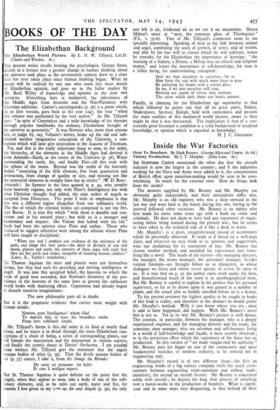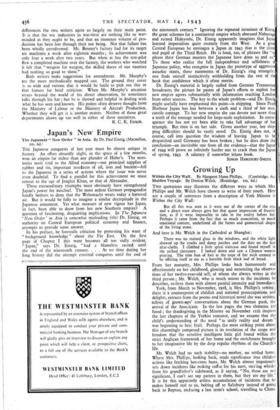Inside the War Factories
Over To Bombers. By Mark Benney. (George Allen and Unwin. 8s. 6d.) Victory Production. By J. T. Murphy. (John Lane. 6a.) SIR STAPFORI) CRIPPS mentioned the other day that the aircraft industry is now the largest in the country ; and if the industries working for the Navy and Army were added to it, the concentration of British effort upon munition-making would be seen to be over- whelming. So much for the external view. How do things look from the inside?
The answers supplied by Mr. Benney and Mr. Murphy are obviously quite independent, and their antecedents differ also. Mr. Murphy is an old engineer, who was a shop steward in the last war and went back to the bench during this one, having in the interval followed other vocations. Mr. Benney is an author who first made his name some years ago with a book on crime and criminals. He does not claim to have had any experience of engin- eering before being trained during the present war ; but he seems to have taken to the technical side of it like a duck to water.
Mr. Murphy's is a plain, straightforward record of occurrences which he personally observed. It reads as if based on a well-kept diary, and whatever we may think of its opinions and suggestions, wins our confidence for its statements of fact. Mr. Benney has chosen another method, and moulded his experiences into some- thing like a novel. The heads of the factory—the managing director, the manager, the stores manager, the personnel manager, besides various foremen—are brought before us as characters, to whose dialogues we listen and whose secret springs of action lie open to us.. It is true that on p. 52 the author starts work under the firm, and thenceforward much of the story is in autobiographical form. But Mr. Benney is careful to explain in his preface that his personal experience, so far as he draws upon it, was gained in a number of plants, and the actual plot so briskly unrolled before us is a fiction.
To the present reviewer the highest quality to be sought in books of this kind is reality, and therefore in the abstract he would prefer Mr. Murphy's method. With it you know where you are ; what is said to have happened, did happen. With Mr. Benney's novel this is not so. Yet in its way Mr. Benney's picture is well drawn. The contrast, in particular, between the manager, who is a deeply experienced engineer, and the managing director and his toady, the sometime store manager, who are salesmen and self-boosters living in a world of half-knowledge and facade, is most acutely observed ; as is the pernicious. effect which the supremacy of the latter has on production. In this version of " art made tongue-tied by authority " Mr. Benney puts his finger on one of the commonest and most fundamental maladies of modern industry, to be noticed not in engineering only.
Mr. Murphy's record is of two different shops—the first an engineering works of a big railway company (with the usual cross- currents between engineering trade-unionism and railway trade- unionism), the second an aircraft factory. Mr. Benny is concerned solely with aircraft ; he depicts the long slow process of switching over a motor-works to the production of bombers. What is signifi- cant and in some ways very disquieting, is that. behind all their
differences the two writers agree so largely on their main point. It is that the war industries in war-time are nothing like so war- minded as they ought to be, and that an immense volume of pro- duction has been lost through their not being. Not that failure has been wholly unredeemed. Mr. Benney's factory had for its target six machines a week after eighteen months ; its achievement was only four a week after two years. But when at last the test-pilot flew a completed machine over the factory, the workers who watched it felt that " weapon for weapon, the skilled slaves of our enemies had nothing so good to show."
Both writers make suggestions for amendment. Mr. Murphy's are the more methodically mapped out. The ground they cover is so wide and various that it would be futile to pick out this or that feature for brief criticism. When Mr. Murphy's attention strays beyond the world of his direct observation, he sometimes talks through his hat ; but he is shrewd and helpful in dealing with what he has seen and known. His points often deserve thought from the Ministry of Labour or the Ministry of Aircraft Production. Whether they will get it is another matter. Neither of those great departments shows up too well in either of these narratives.
R. C. K. ENSOR.



























 Previous page
Previous page